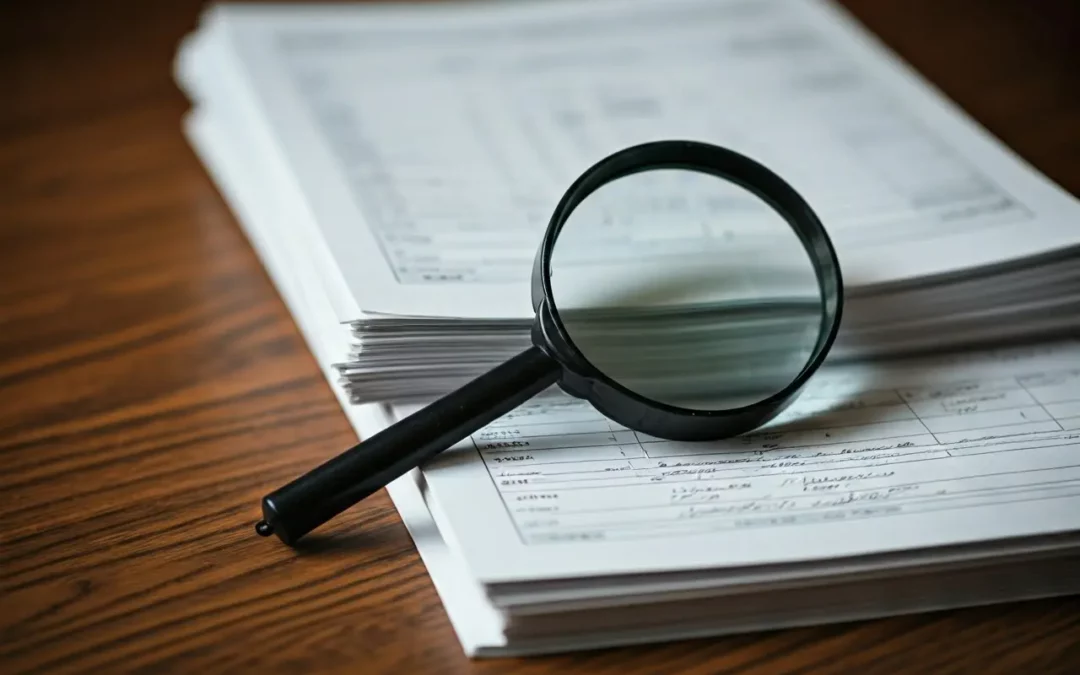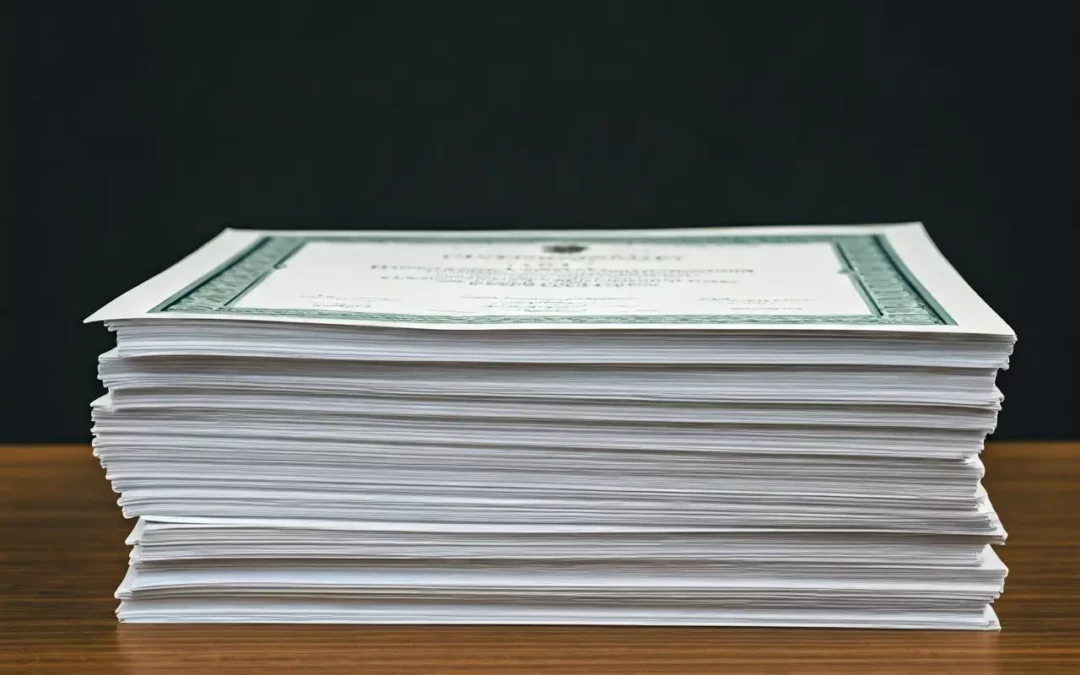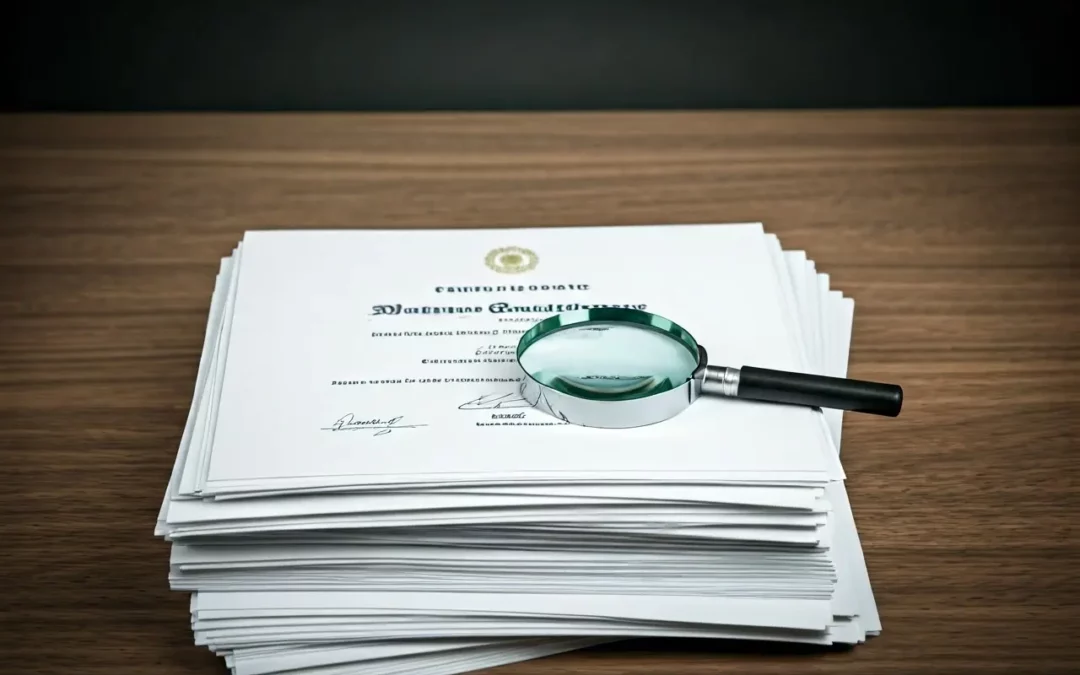
by Kanika Jiwnani | Feb 26, 2025 | Most Viewed, Transcripts Services

In today’s world, when education and jobs are international, verifying academic records and certificates has become a critical duty. Whether you are applying for a job or looking for an appropriate university for further education, it is important to have your papers confirmed by transcript verification services. This page will explain the significance of transcript verification, as well as the university and online verification processes.
Need help with the Transcript Verification Service? Contact Us Now!
What Is a Transcript Verification Service?
A transcript verification service is a process that authenticates and validates the academic records, which are majorly issued by educational institutions. These services confirm the authenticity of the documents, preventing fraud and verifying the credentials from the given.
Read more: 8 Common Challenges Resolved by Transcript Verification Services
Importance of Academic Transcript Verification
- It is critical for higher education as the transcript verifications ensure that the applicant meets the required qualifications.
- One can rely on the transcripts that the person applying for the job is qualified enough and can match the standards of the organization.
- For multiple countries, it is mandatory for one to have their credibility in hand, that is, their transcripts verified in advance for the purpose of immigration and visas.
- Verified documents help to build confidence in your submitted credentials and avoid fraudulent submissions of the documents.
University Transcript Verification Process
The university transcript verification process varies depending on the institution and verification provider. However, the general steps involved are:
- The applicant provides copies of academic documents and transcripts supporting all the required documents.
- The university then checks the documents with their original or preexisting records
- After this, the university issues a report confirming the authenticity of the transcripts as well as any other document that has been submitted.
- The verified transcripts are sent to the concerned organizations or requested organizations.
Types of Transcript Verification Services
- University-Provided Verification: Some universities offer direct university transcript verification through their registrar’s office.
- Third-Party Verification Services: Independent agencies provide professional transcript services to verify transcripts on behalf of institutions and employers.
- Online Transcript Verification Services: Many organizations offer digital verification to facilitate faster processing.
- Government-Affiliated Verification: Some countries require government agencies to verify educational documents for international applications.
Online Transcript Verification Services
With technological advancements, Online Transcript Services have gained popularity due to their efficiency and reliability. Key benefits of using an online verification service include:
- Faster Processing: Digital platforms expedite the verification process, reducing wait times.
- Secure Transactions: Online verification ensures document authenticity through encrypted databases.
- Convenience: Applicants can submit requests remotely without needing to visit the university in person.
- Real-Time Status Updates: Many services provide tracking systems to monitor verification progress.
How to Choose the Right Transcript Verification Service
When selecting a transcript verification service, consider the following factors:
- Accreditation & Legitimacy: Ensure that the service provider is recognized by universities and regulatory bodies.
- Turnaround Time: Choose a service that meets your timeline requirements.
- Service Costs: Compare pricing to find a cost-effective solution.
- Global Acceptance: Ensure the service is accepted by international institutions and employers.
- Customer Support: Opt for a service with responsive customer assistance.
Common Challenges in the Transcript Verification Process
Despite the availability of online transcript services, applicants may face challenges such as
- Delays in Processing: Some universities take longer to respond to verification requests.
- Incomplete Documentation: Missing or incorrect documents can slow down the verification process.
- Authentication Issues: Some institutions have strict policies requiring additional steps for document validation.
- High Costs: Depending on the service provider, verification fees can be expensive.
Read more: Navigating Electronic Transcript Applications with World Document Services
Frequently Asked Questions (FAQs)
1. How long does the transcript verification process take?
This depends on the university as well as on the service provider, along with the method of application.
2. Can I verify my transcript online?
Yes, many universities allow verification through the online website. You can submit your documents via digital medium and authenticate them digitally.
3. Is transcript verification necessary for studying abroad?
Yes, most universities abroad require transcript verification for study abroad to confirm the authenticity of academic records before admission.
4. How much does transcript verification cost?
The cost varies depending on the service provider and the university’s verification fees. Some third-party services may charge additional processing fees.
5. What happens if my transcript cannot be verified?
If the transcript is not verified, you must contact your university for help.
6. Can employers request transcript verification directly?
Yes, employers can use Professional Transcript Services to verify a candidate’s educational background before hiring.
7. What documents are required for transcript verification?
Here are the documents required: Transcript, ID proof, and other information.
Conclusion
A transcript verification service plays a crucial role in ensuring academic document authenticity for education, employment, and immigration purposes. With various verification methods available, including University Transcript Verification, Professional Transcript Services, and Online Transcript Verification Services, applicants can choose the most suitable option based on their needs. Understanding the transcript verification process helps individuals and organizations streamline the verification process, ensuring smooth and hassle-free documentation for academic and professional endeavors.
Download the World Document Services App.
You may enjoy a hassle-free experience by downloading our mobile app from either the App Store or the Play Store. It works with both iOS and Android devices.

by Kanika Jiwnani | Feb 24, 2025 | Certificate Attestation, Most Viewed

In today’s globalized world, students and professionals frequently move across borders for education, employment, and immigration purposes. If you’re planning to study abroad, apply for a visa, or undergo credential evaluation, obtaining a Medium of Instruction Certificate (MOI Certificate) can be crucial. This serves as official proof of your education that it was conducted in a certain language. In this article, we will explore how the medium of instruction can influence your academic and professional journey.
Need help with the MOI Certificate? Contact Us Now!
What is a Medium of Instruction Certificate?
A Medium of Instruction A certificate is an official document issued by educational institutions confirming the language in which a student completed their education. It is widely used for study abroad applications, immigration processes, and credential evaluations. Universities, employers, and immigration authorities often require this certificate to assess a candidate’s language proficiency.
Read more: Can Medium of Instructions Affect My Migration Process?
Why is a Medium Instruction Certificate Important?
1. Facilitates Higher Education Admissions
MOI is an essential document that helps one to prove that their previous educational mode or medium was English. It helps one avoid examinations like IELTS and TOEFL. If you are an individual with plans of studying abroad in the near future or are currently planning for the same, the MOI is an essential document for you, as it acts as proof that your previous education was conducted in English and also helps to let go of the requirement of English proficiency tests like IELTS and TOEFL. A MOI certificate may help you secure admission without additional language tests.
2. Supports Visa Applications
Many countries have mandated language proficiency as a part of their visa application process. Here, an MOI certificate for a visa will play a major role in this entire process, acting as an alternative to a language proficiency exam, which is not only convenient but also efficient in this time-consuming process. Some visa categories accept MOI as proof of language skills if you are not from a country where English is a language.
3. Essential for Immigration Purposes
A Medium of Instruction Certificate for Immigration is often required when applying for residency or work permits in English-speaking nations like Canada, the UK, and Australia. Immigration authorities may request proof of English proficiency, and an MOI certificate can simplify the documentation process. If you’re applying for permanent residency or skilled worker programs, having an MOI certificate can strengthen your application.
4. Required for Credential Evaluations
A medium of instruction certificate for immigration is often required when one is applying either for PR or residency in any country. It is also mandatory for work permits, especially in nations like Canada, the UK, and Australia. Immigration authorities probably would prefer you to have an MOI or proof of language proficiency. Having an MOI certificate can strengthen your application.
5. Helps in Employment Opportunities
Many employers require proof of language proficiency when hiring an individual from a non-English-speaking language country; an MOI certificate helps as additional proof of your language proficiency and helps you avoid language proficiency examinations.
Methods to Obtain a Medium Instruction Certificate?
If you need an MOI certificate, follow these simple steps:
- Contact Your University or College: Reach out to your academic institution’s administration or registrar’s office and request an official Medium Instruction Certificate.
- Provide Necessary Details: Some institutions require a written request, personal identification, and academic records to process your request.
- Pay the Required Fees: Certain universities charge a processing fee for issuing an MOI certificate.
- Obtain a sealed and signed copy: Ensure that the certificate is signed, stamped, and issued on official letterhead.
- Translate the document if necessary: If the certificate is not in English, you may need to get it translated by a certified translator.
MOI Certificates contain:
A valid Medium of Instruction Certificate should include the following details:
- Student’s full name
- Name of the educational institution
- Degree or course completed.
- Duration of the program
- Official confirmation that the medium of instruction was English
- Institution’s seal and authorized signature
Challenges faced along with Solutions
1. The university doesn’t issue MOI certificates.
Some universities may not provide an MOI certificate. In such cases, you can request a letter from a professor or department head or submit other supporting documents like transcripts that indicate the language of instruction.
2. Delayed Processing Time
MOI certificate requests may take time due to administrative procedures. It’s advisable to apply well in advance before submission deadlines for visa applications or university admissions.
3. Requirement for Notarization or Apostille
Always check the requirements of the evaluation body as well as the university to understand whether notarizing or apostille is needed at the time of immigration.
Certain immigration and credential evaluation bodies may require the MOI certificate to be notarized or apostilled. Check the specific requirements before submission.
Read more: MOI Certifications: Bridging the Gap in Cross-Border Education Validation
FAQs
1. Is a Medium of Instruction Certificate mandatory for studying abroad?
The requirement of an MOI varies from university to university, depending upon the requirement, and it helps you waive the English communication exam.
2. Can an MOI certificate replace IELTS or TOEFL?
As per the university, if they accept MOI instead of your IELTS and TOEFL, then. However, it is suggested that requirements be checked beforehand, as it may require both TOEFL and IELTS.
3. How long does it take to obtain an MOI Certificate?
The timeline can vary depending on the university and mode of application. It again varies from university to university and can take anywhere from weeks to days to months, depending upon your application timeline.
4. Does an MOI certificate have an expiration date?
No MOI Certificates have an expiration date. Some institutes require the latest MOIs, but they are also conditional on which university or employer they are applying to.
5. What should I do if my university refuses to issue an MOI certificate?
You can submit alternative documents, like transcripts or letters of request.
Final Thoughts
A Medium Instruction Certificate plays a vital role in your academic and professional journey. Whether you need it for higher studies, visa applications, credential evaluation, or immigration purposes, ensuring that you have this document ready can save time and effort. If you are planning to move abroad for education or work, check the requirements early and obtain your MOI certificate from your university without delay.
By understanding the importance of a Medium Instruction Certificate for Study Abroad, an MOI Certificate for Visa Application, and a Medium Instruction Certificate for Immigration, you can make your education and career transition smoother and hassle-free.
Download the World Document Services App.
You may enjoy a hassle-free experience by downloading our mobile app from either the App Store or the Play Store. It works with both iOS and Android devices.

by Kanika Jiwnani | Feb 19, 2025 | Document Verification, Most Viewed

Degree verification in India can often feel like navigating a complex maze. From universities to employers, the process involves multiple stakeholders and can be fraught with difficulties. In this blog, we’ll explore the common challenges faced during degree verification in India and how one can overcome them.
Need help with the Degree Verification process in India? Contact Us Now!
Common Challenges in Degree Verification in India
Degree verification is an important process in matters of migration, whether for employment or educational purposes. This is a lengthy process that involves multiple steps, starting from contacting the university to getting the entire process sorted, concluding it by getting your degree verified. However, this process is lengthy, has its own challenges, and creates many issues, such as inaccuracies, errors, and delays, which often cause trouble for the applicant.
Read more: What Documents Do I Need for University Degree Verification?
1. Lack of a Centralized Degree Verification System
One of the biggest challenges in India is the absence of a centralized record system for academic credentials. With thousands of universities deemed universities and colleges maintaining separate records, accessing verification data becomes cumbersome. Unlike some developed nations with unified academic databases, India’s fragmented system causes delays and inefficiencies. Establishing a centralized database would streamline the verification process, making it more efficient and accessible.
2. Manual and Paper-Based Processes
Many universities in India are still functioning on traditional paper-based record-keeping of documents or maintaining the records, which is now pretty outdated as well as less reliable. Keeping an outdated working pattern slows down the entire verification process, making it less reliable and error-free. Having a paper-based record increases the chances of misplacement and errors in the records.
3. Inconsistent Verification Procedures
The degree verification process varies entirely from university to university. Some institutes have a traditional way of bookkeeping; some have a modern one. Some universities do not have a predefined process of degree; some have methods that one can follow and obtain. This inconsistency leads to delay, and only proper planning can help you avoid this delay.
4. Delays in Response from Universities
A common issue in academic credential verification is the prolonged response time from universities. Due to multiple drawbacks and inefficiencies, understaffed departments, and administrative bottlenecks, it can take weeks or even months to process verification requests. These delays can negatively impact job opportunities, admission timelines, and visa applications.
5. Forgery and Fraudulent Degrees
Fake degree certificates and fraudulent academic claims are widespread in India. Many individuals attempt to avoid verification by presenting fraudulent documents. This has made it essential for organizations to implement a strict degree verification process. Figuring out the genuine credentials from fraudulent ones still remains a challenge, especially when universities lack a transparent and uniform verification system.
6. Limited Digital Infrastructure
Some universities, with time, have developed and have started to maintain the digital verification method, while others are still enticed by the traditional paperback method of verification. In the absence of digital methods and uniform methods, many individuals are forced to rely upon postal communication, which is also inefficient and makes the entire process a hassle.
7. High Verification Costs
The cost of verification again is similarly a barrier for individuals and organizations, as these universities have varied and scattered fee systems. Some institutes charge the fees of verification along with the application of transcripts, while others consider it an individual cost. The verified degree to be sent to a domestic address or to be sent to an international employer is also a point where the cost will differ.
8. Complexity in Verifying Foreign Degrees
For Indian students who have studied abroad, verifying foreign degrees can be even more complicated. Validation from international institutes is given to students who follow the Indian educational system. Lacking a uniform system makes the entire process lengthy and creates a long waiting list and waiting periods.
9. Limited Awareness and Guidance
Many students and professionals planning to move abroad and pursue their careers ahead of time are unaware of the fact that there’s a step such as degree verification. A lack of such information makes it difficult for one to also understand the correct degree verification process and struggle to find the right one as well. Unclear guidelines from the university make it difficult for one to obtain the documents verified on time, and the process is complicated.
10. Data Privacy and Security Concerns
With increasing digitization, data security is a major concern in academic credential verification. Universities and verification agencies must ensure that personal and educational data are protected from cyber threats and unauthorized access. The risk of data breaches or misuse of sensitive academic records discourages institutions from fully adopting digital verification methods.
Solutions to Improve the Degree Verification Process in India
While challenges persist, several measures can enhance and streamline the degree verification process:
- Centralized Database: A common database for academic records would simplify verification and reduce inconsistencies.
- Digital verification methods: Universities must start to use blockchain-based verification systems to enhance efficiency and reduce fraud.
- Verification Procedures: Establishing a uniform verification process across all universities will create transparency and accessibility.
- Automation and AI Integration: Leveraging AI-driven verification tools can help detect fake degrees and speed up the record retrieval process.
- Awareness Campaigns: Educating students and employers on the correct verification procedures can reduce errors and miscommunication.
How World Document Services Can Help
For individuals and organizations looking for a streamlined verification process, professional degree verification services can be highly beneficial. We at World Document Services help you obtain and verify academic credentials efficiently, minimize delays, and ensure authenticity and reliability. With expertise in handling verification requests, we help navigate complex procedures and provide reliable solutions for academic record verification.
Read more: 10 Reasons Why University Degree Verification is Essential for Employers
Conclusion
Degree verification in India is a complex process with multiple challenges, including inconsistent procedures, delays, high costs, and fraudulent degrees. While steps are being taken to improve the system, more effort is required to standardize and digitalize the verification process. By adopting centralized, secure, and efficient verification methods, India can enhance the credibility of its education system and facilitate smoother verification for individuals and organizations alike.
Download the World Document Services App.
You may enjoy a hassle-free experience by downloading our mobile app from either the App Store or the Play Store. It works with both iOS and Android devices.
FAQ:
Q: Why is degree verification important?
A: It helps the employees and educational institutions to ensure that the documents submitted by the individual are authentic and are shared by the university themselves.
Q: How long does the degree verification process take in India?
A: It varies depending on the university. If the documents submitted are correct, it can take weeks or other than months to years if there are any errors.
Q: How can I verify my degree from an Indian university?
A: Both online and offline models are available. But if you are present in the same city as your university, it is suggested that you visit and attempt to get verified.
Q: What are the costs associated with degree verification?
A: Cost entirely depends on the number of copies applied. Mode of application, i.e., online or offline, method expedited or normal. The cost may vary as per your requirements.
Q: Can fake degrees be detected?
A: Yes, rigorous verification processes can help identify fraudulent degrees.

by Kanika Jiwnani | Feb 17, 2025 | Certificate Attestation, Most Viewed

When planning to migrate, especially for educational or professional purposes, you might have come across the term ‘medium of instruction.’ With so many details to consider in the migration process, it can be puzzling to determine whether or not the medium of instruction will play a role. This FAQ will guide you through the potential impacts and considerations regarding the medium of instruction in your migration journey.
When you are an individual planning to move to another country for any purpose, such as immigration or such, the purpose is to work. Along with your transcripts, there are many other documents required; one of them is the medium of instruction. This certificate plays a very important role in migration processes, as it is also considered the proof of language. In this article, we will understand how the MOI certificate plays a crucial role and why it is essential for international students.
Need help with the MOI Certificate? Contact Us Now!
What is a Medium of Instruction (MOI) Certificate?
A medium of instruction is an official document that is issued by the university you studied at supporting your immigration process, and this is the certificate that helps the authorities verify whether the applicant possesses all the required language skills, which are essential for you to have for professional as well as academic success.
Read more: MOI Certifications: Bridging the Gap in Cross-Border Education Validation
How Does the Medium of Instruction Affect Migration?
The medium of instruction verification is an integral part of migration-related evaluations. Here’s how it impacts different aspects of migration:
1. University Admissions for International Students
Most institutions and universities require proof of English language proficiency through assessment tests that are standardized and universally accepted. However, some can work with MOI as well, and no extra tests and examinations are needed. This is a benefit to many students and working professionals who want to bypass the language proficiency tests.
2. Work Visas and Employment Opportunities
Some employers request educational documents for migration, including an MOI certificate, to confirm that a candidate can communicate effectively in the workplace.
3. Immigration and Visa Application Process
Proof of education is needed by certain institutes in a particular language, i.e., English. In countries like Canada, Australia and the UK, institutions of these nations often require proof of English-medium education as a part of the migration process.
Importance of Medium of Instruction Verification
1. Ensuring Authenticity: MOI verification helps confirm that the certificates issued are authentic and genuine, are issued by the institution, and are recognized by immigration authorities as well.
2. Supports language proficiency claims: Many applicants use MOI as an alternative to language tests, making verification crucial for acceptance by educational institutions and employers.
3. Helps in avoiding delays in migration processing: Providing an MOI certificate on the spot, including it with other educational documents for migration, can help you avoid delays in visa processes or in getting admission to your desired university.
How to Obtain an MOI Certificate?
To get an MOI certificate for migration, follow these steps:
- Contact Your University: Request the certificate from the academic office or registrar.
- Check Language Requirements: Ensure that the language mentioned matches the immigration or university requirements.
- Submit for Verification: Some authorities may require attestation or notarization of the certificate.
- Include It in Your Application: Attach the verified MOI certificate with other required documents.
For those who find the process challenging, World Document Services can assist in obtaining your MOI certificate quickly and hassle-free. We specialize in handling educational document requests and ensuring they meet the necessary migration requirements.
Countries That Recognize MOI Certificates for Migration
- Canada: accepted for student visas and some work permits, depending on the institution.
- Australia: Often considered for educational and skilled migration purposes.
- United Kingdom: Some universities accept MOI as proof of English proficiency.
- United States: Limited acceptance, with most institutions preferring TOEFL/IELTS.
- Germany & European Countries: Some universities accept MOI, but local language proficiency may still be required.
Read more: 10 Things You Didn’t Know About Migration and Convocation Certificates: What is MOI’s Role?
Conclusion
The Medium of Instruction (MOI) certificate plays a crucial role in the migration process, especially for students and professionals aiming to move abroad. While it can serve as an alternative to language proficiency tests, its acceptance varies across institutions and immigration authorities. Ensuring proper medium of instruction verification and including all educational documents for migration will increase the chances of a smooth application process.
If you need assistance in obtaining your MOI certificate or ensuring it meets migration requirements, World Document Services is here to help. Our expertise in educational document procurement makes the process seamless and stress-free.
Download the World Document Services App.
You may enjoy a hassle-free experience by downloading our mobile app from either the App Store or the Play Store. It works with both iOS and Android devices.
FAQs
Q: Is an MOI certificate enough for migration?
A: No, it is not; some institutions and employers accept it, while others may still require standardized language proficiency tests like IELTS or TOEFL.
Q: How long does it take to obtain an MOI certificate?
A: The processing time varies by institution but typically takes 1-4 weeks. It is advisable to apply early.
Q: Do all universities accept MOI as proof of language proficiency?
A: No, acceptance depends on the institution and the country’s immigration policies.
Q: Is MOI mandatory for student visa applications?
A: It depends on the destination country. In some places, MOI is optional, whereas in some, it is considered important.
Q: Can I use an MOI certificate for work visa applications?
A: Yes, but its acceptance depends on the employer and industry. Some institutions and companies might need additional certifications as well.
By understanding the role of an MOI certificate for immigration, people and applicants can prepare better to commute and travel, avoiding all the pitfalls in the pathway.

by Kanika Jiwnani | Feb 10, 2025 | Most Viewed, Transcripts from University, Transcripts Services

Navigating university transcript services can seem daunting at first, but with a little explanation, it becomes a straightforward process. This FAQ will break down everything you need to know in simple terms, so you can access your educational records with ease.
In this world where academics and education play an important role, university transcripts are of very high importance. These documents are usually called academic records, reflecting a student’s performance and achievement during the entire academic period. If you are planning to immigrate abroad for a job or for higher studies, your transcript is an essential credential document you must carry. In this article, we will understand how university transcript services work and why they are important for various academic and professional goals.
What Are University Transcript Services?
University transcript services are a way of obtaining professional solutions provided by institutions and agencies or online platforms for obtaining your official academic transcripts. These services are mostly for the benefit of students and alumni of any particular university wanting to study abroad or immigrate for any of the reasons.
These services ensure that the transcripts are accurately processed, authenticated, and securely delivered to the desired institution or organization by the students.
Read more: Dropped Out? You Can Still Get Your University Transcript!
How University Transcript Services Operate
- Requesting transcripts: The process initiates when the applicants put up an application from their university. This can be both online as well as offline.
- Verification and authentication: The documents are verified, and credentials are checked before the transcript is processed. Checking the documents helps the university verify the authenticity of the applicant. This process is known as university transcript verification.
- Preparation of Transcripts: Once verified, the university prepares the official document. The transcript usually includes:
- The student’s name and identification number.
- The courses taken, grades achieved, and credits earned.
- The academic year and semester details.
- The overall GPA or percentage.
- Delivery Options: Most universities now provide online university transcript services and allow students to request their transcripts electronically. Copies may be delivered through postal or courier services upon request. The security of the document is guaranteed during delivery.
- Additional Services: Some offer professional transcript services, which include document translation, notarization, or attestation for international applications.
Types of Transcript Services
Online Transcript Services
Digital platforms have made a drastic change in how transcripts are requested and delivered. Within just a few clicks, students can:
- Submit requests.
- Track the status of their applications.
- Receive soft copies for immediate use.
Professional Transcript Services
For international applications or complex requirements, professional services help in the following ways:
- Document verification.
- Credential evaluations.
- Official translations in multiple languages.
University Transcript Verification
This service ensures that the transcript is authentic and matches the academic records held by the issuing institution. It is necessary for:
- University admissions.
- Job applications.
- Immigration procedures.
Why Are Transcript Services Important?
1. Seamless Applications
When applying to universities or jobs, transcripts act as proof of your academic qualifications, ensuring a smooth application process.
2. Professional Credibility
Verified transcripts enhance credibility, especially when seeking employment or opportunities in foreign countries.
3. Saves Time and Effort
With online university transcript services, the process is streamlined, saving applicants from the hassle of visiting universities in person.
4. Meets International Standards
For students applying abroad, these services ensure that transcripts meet the specific requirements of foreign universities and organizations.
Common Challenges in Transcript Services
- Delays with Processing: Universities have lengthy timelines for processing the transcripts, which can be a challenge for applicants who need their documents with the utmost urgency.
- Errors in Academic Records: Mistakes in any of the submitted documents can cause an issue in the entire application.
- Lost Documents: The traditional postal services always happen to make an error while delivering the document, emphasizing the need for reliable postal services. Which can help in avoiding the delay of the entire process.
- Limited Awareness: Many people aren’t aware of such academic transcript services that can help you get your documents to your doorstep with ease. Helping you to avoid all the hurdles.
How to Choose the Right University Transcript Service
Consider the factors before opting for the right service providers.
- Reputation: When opting for the service providers, be sure to choose the services with positive reviews and track records, like World Document Services, ensuring accuracy and timely delivery.
- Cost: Try comparing the prices with those of another service provider to ensure that you are not being overcharged.
- Turn-around time: The time required for processing and delivery ought to be taken into account, especially if you are working with urgent deadlines.
- Additional Features: Look for services that offer add-ons like verification, translation, or attestation.
Read more: Can Electronic University Transcripts Be Authenticated Too?
Conclusion
Student and alumni access to their transcripts has been made easy through the transcription services provided by universities. Online solutions and professional support guarantee the accuracy of all transcripts issued and distributed within a stipulated timeframe for various academic and professional uses.
Once students become familiar with how such services work, they will feel confident in the process and use less time and effort. All individuals seeking further study, job vacancies, or immigration always want to avail opportunities through the transcript service for their application to be highly rated.
Download the World Document Services App.
You may enjoy a hassle-free experience by downloading our mobile app from either the App Store or the Play Store. It works with both iOS and Android devices.
FAQs
Q: What is the difference between an academic transcript and a degree certificate?
A: An academic transcript details your coursework, grades, and academic achievements, whereas a degree certificate is proof of graduation.
Q: Can I get my university transcript online?
A: Yes, many universities now provide online transcript services where you can request, track, and receive your transcript digitally.
Q: How long does it take to process a transcript request?
A: Processing times vary by university but typically range from a few days to several weeks. Using professional transcript services can expedite the process.
Q: What should I do if there’s an error in my transcript?
A: Contact your university’s registrar or academic office immediately to request corrections. University transcript verification ensures accuracy before submission.
Q: Are digital transcripts accepted by all institutions?
A: Most universities and employers accept digital transcripts, but it’s always best to check the specific requirements of the institution or organization.
Q: How can I track my transcript request?
A: Universities and online transcript services usually provide tracking features to monitor your application status.
Page 2 of 6«12345...»Last »











 Call Us
Call Us Mail Us
Mail Us WhatsApp
WhatsApp
